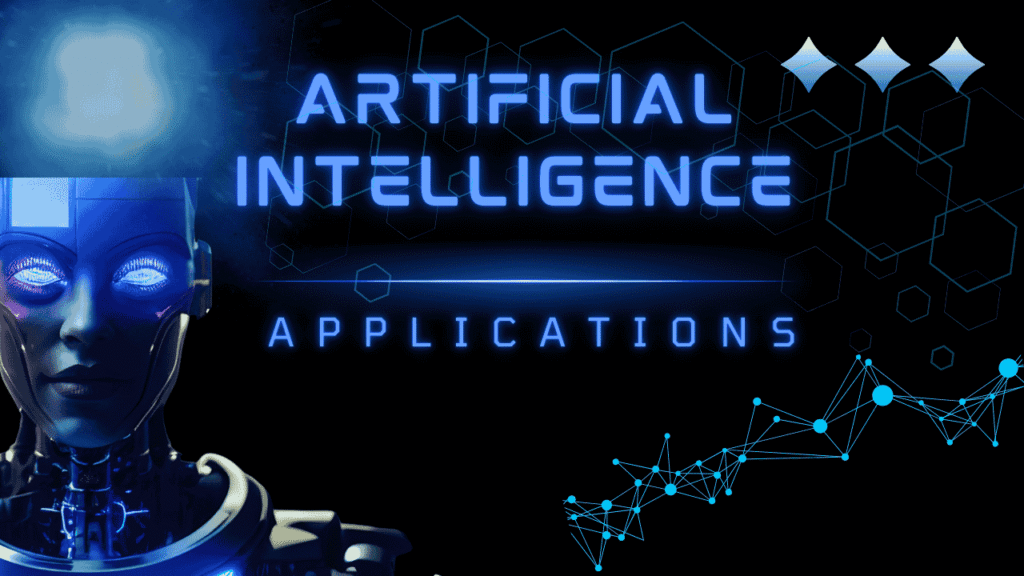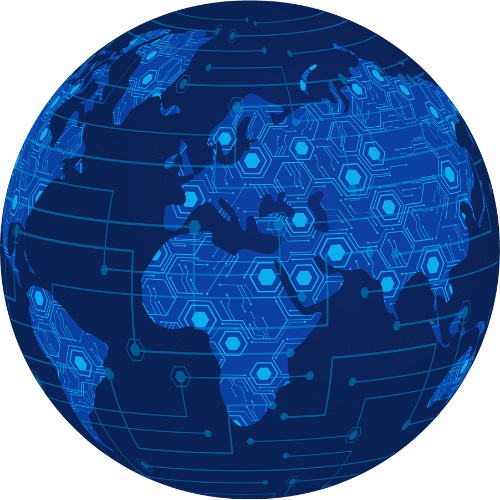Artificial Intelligence Applications (AI) is revolutionizing the healthcare industry by enhancing patient care, diagnosis, and treatment.

AI-powered systems can analyze vast amounts of medical data to identify patterns and trends that may not be apparent to human healthcare providers.
For instance, AI algorithms can analyze medical images such as X-rays and MRIs to detect abnormalities and assist radiologists in making more accurate diagnoses.
Additionally, Artificial Intelligence Applications can help in predicting patient outcomes and identifying individuals at risk of certain diseases by analyzing genetic and clinical data. Moreover, AI-powered chatbots and virtual health assistants are being used to provide personalized medical advice and support to patients, improving access to healthcare services. Furthermore, AI is also being utilized in drug discovery and development, significantly accelerating the process of identifying potential drug candidates and reducing the time and cost involved in bringing new medications to market.
By leveraging machine learning algorithms, researchers can analyze large datasets to identify promising compounds for treating various diseases. Additionally, AI is playing a crucial role in the development of precision medicine, where treatments are tailored to individual patients based on their genetic makeup and other factors. Overall, Artificial Intelligence Applications is transforming healthcare by improving diagnostic accuracy, personalizing treatment approaches, and enhancing patient engagement.
Key Takeaways
- Artificial Intelligence Applications is revolutionizing healthcare by improving diagnostics, personalized treatment plans, and drug discovery.
- In transportation and logistics, AI is optimizing route planning, predicting maintenance needs, and enhancing supply chain management.
- AI is transforming financial services with fraud detection, risk assessment, and personalized financial advice.
- In education, AI is personalizing learning experiences, automating administrative tasks, and providing virtual tutoring.
- AI is contributing to environmental sustainability through energy optimization, waste management, and climate change prediction.
Artificial Intelligence Applications Impact on Transportation and Logistics
The impact of AI on transportation and logistics is profound, with applications ranging from autonomous vehicles to predictive maintenance of transportation infrastructure. Autonomous vehicles, powered by AI algorithms, have the potential to revolutionize the way people and goods are transported. These vehicles can enhance road safety, reduce traffic congestion, and provide mobility solutions for individuals with limited mobility.
Moreover, AI-powered predictive analytics are being used to optimize logistics operations, including route planning, inventory management, and demand forecasting. By analyzing historical data and real-time information, AI systems can help transportation companies make informed decisions to improve efficiency and reduce costs. In addition, AI is transforming the supply chain industry by enabling predictive maintenance of critical infrastructure such as bridges, roads, and railways.
By analyzing sensor data and identifying patterns indicative of potential failures, AI systems can help prevent costly breakdowns and ensure the safety and reliability of transportation networks. Furthermore, AI-powered drones are being used for tasks such as inventory management in warehouses and last-mile delivery of goods. Overall, Artificial Intelligence Applications is reshaping the transportation and logistics sector by improving safety, efficiency, and sustainability.
The Role of Artificial Intelligence Applications in Financial Services
Artificial Intelligence Applications is playing a significant role in transforming the financial services industry by enabling more personalized customer experiences, enhancing fraud detection, and improving risk management. One of the key applications of AI in finance is the development of chatbots and virtual assistants that can interact with customers in natural language to provide personalized financial advice, assist with transactions, and answer inquiries. These AI-powered tools are enhancing customer engagement and satisfaction while reducing the need for human intervention in routine tasks.
Moreover, AI is being used to detect fraudulent activities in real-time by analyzing large volumes of transaction data and identifying anomalous patterns indicative of potential fraud. By leveraging machine learning algorithms, financial institutions can improve their ability to detect and prevent fraudulent activities while minimizing false positives. Additionally, AI is revolutionizing risk management in finance by enabling more accurate credit scoring models, assessing market risks, and optimizing investment portfolios.
By analyzing diverse sources of data, including market trends, customer behavior, and economic indicators, AI systems can provide valuable insights to financial institutions for making informed decisions. Furthermore, AI is transforming the investment management industry by enabling algorithmic trading strategies that can analyze market conditions and execute trades at high speeds. These AI-powered trading systems can identify profitable opportunities and manage investment portfolios with greater efficiency.
Overall, AI is reshaping the financial services sector by improving customer experiences, enhancing security measures, and optimizing decision-making processes.
Artificial Intelligence Applications Influence on Education and Learning
Artificial Intelligence Applications is influencing education and learning by enabling personalized learning experiences, automating administrative tasks, and providing intelligent tutoring systems. AI-powered educational platforms can analyze students’ learning behaviors and preferences to deliver personalized learning materials tailored to their individual needs. By leveraging machine learning algorithms, these platforms can adapt to students’ progress and provide targeted support to enhance their learning outcomes.
Moreover, AI is being used to automate administrative tasks in educational institutions, such as grading assignments, scheduling classes, and managing student records. This automation allows educators to focus more on teaching and mentoring students rather than on repetitive administrative tasks. Additionally, AI-powered intelligent tutoring systems are providing students with personalized support and feedback to improve their academic performance.
These systems can analyze students’ responses to questions and provide targeted guidance based on their strengths and weaknesses. Furthermore, AI is being utilized in language learning applications to provide real-time feedback on pronunciation and grammar usage. By leveraging speech recognition technology and natural language processing algorithms, these applications can enhance language learning experiences for students.
Moreover, Artificial Intelligence Applications is facilitating the development of adaptive assessment tools that can evaluate students’ knowledge and skills in a more comprehensive and personalized manner. These tools can analyze students’ responses to questions and adjust the difficulty level based on their performance, providing a more accurate assessment of their abilities. Overall, AI is transforming education by providing personalized learning experiences, automating administrative tasks, and enhancing the effectiveness of teaching and learning processes.
Artificial Intelligence Applications Contribution to Environmental Sustainability
Artificial Intelligence (AI) is contributing to environmental sustainability by enabling more efficient resource management, optimizing energy consumption, and facilitating environmental monitoring and conservation efforts. AI-powered systems are being used to analyze large datasets related to environmental factors such as air quality, water pollution, and deforestation. By leveraging machine learning algorithms, these systems can identify patterns and trends that can help environmental scientists and policymakers make informed decisions to address environmental challenges.
Furthermore, AI is being utilized in smart grid systems to optimize energy distribution and consumption by analyzing real-time data from energy networks. By predicting energy demand patterns and identifying opportunities for energy conservation, AI systems can help reduce energy waste and minimize environmental impact.
Additionally, Artificial Intelligence Applications-powered predictive analytics are being used in agriculture to optimize crop management practices such as irrigation scheduling, pest control, and yield prediction.
By analyzing diverse sources of data including weather patterns, soil conditions, and crop health indicators, AI systems can help farmers make more informed decisions to improve agricultural productivity while minimizing environmental impact. Moreover, AI is facilitating the development of autonomous environmental monitoring systems that can collect real-time data on environmental conditions such as air and water quality. These systems can help identify pollution sources, monitor wildlife habitats, and support conservation efforts.
Overall, Artificial Intelligence Applications is contributing to environmental sustainability by enabling more efficient resource management, optimizing energy consumption, and supporting environmental monitoring and conservation initiatives.
Artificial Intelligence Applications Role in Improving Customer Service and User Experience
Artificial Intelligence Applications is playing a crucial role in improving customer service and user experience across various industries by enabling personalized interactions, automating support processes, and enhancing product recommendations. AI-powered chatbots and virtual assistants are being used to provide personalized support to customers by understanding their inquiries and providing relevant information or assistance. These chatbots can handle a wide range of customer queries efficiently while freeing up human agents to focus on more complex issues.
Moreover, AI is being utilized to automate customer support processes such as ticket routing, issue resolution, and feedback analysis. By leveraging natural language processing algorithms, AI systems can understand customer feedback and sentiment to improve service quality continuously. Additionally, AI-powered recommendation systems are enhancing user experience by analyzing user preferences and behavior to provide personalized product recommendations across e-commerce platforms, streaming services, and content platforms.
Furthermore, AI is transforming the retail industry by enabling personalized shopping experiences through virtual stylists that can recommend clothing items based on individual preferences and body types. These virtual stylists leverage image recognition technology and machine learning algorithms to understand customers’ fashion preferences and provide tailored recommendations. Moreover, AI-powered visual search tools are allowing customers to search for products using images rather than text queries.
Overall, Artificial Intelligence Applications is revolutionizing customer service by providing personalized interactions, automating support processes, and enhancing user experience across various industries.
The Future of Artificial Intelligence Applications in Entertainment and Media
The future of Artificial Intelligence (AI) in entertainment and media holds immense potential for transforming content creation, distribution, personalization, and audience engagement. AI-powered content creation tools are enabling creators to generate high-quality content more efficiently by automating tasks such as video editing, music composition, and graphic design. These tools leverage machine learning algorithms to understand creative preferences and generate content that aligns with creators’ vision.
Moreover,Artificial Intelligence Applications is revolutionizing content distribution by enabling personalized recommendations across streaming platforms based on users’ viewing habits and preferences. By analyzing vast amounts of user data using machine learning algorithms, these recommendation systems can enhance user engagement by suggesting relevant content tailored to individual interests. Additionally, AI is being utilized in the gaming industry to enhance player experiences through features such as intelligent game design, dynamic difficulty adjustment based on player skill levels, and personalized in-game interactions.
These AI-powered gaming experiences provide players with more immersive and engaging gameplay tailored to their preferences. Furthermore, AI is transforming audience engagement through personalized marketing strategies that leverage predictive analytics to understand consumer behavior better. By analyzing diverse sources of data including social media interactions, browsing history, and purchase patterns using machine learning algorithms, media companies can create targeted marketing campaigns that resonate with individual audiences.
Overall, the future of AI in entertainment and media holds promise for revolutionizing content creation processes, enhancing audience engagement through personalized experiences across various platforms. In conclusion,
Artificial Intelligence (AI) has the potential to revolutionize various industries by enabling innovative applications that enhance efficiency, improve decision-making processes, personalize experiences for users or customers while contributing to environmental sustainability. From healthcare to transportation logistics or financial services or education or entertainment media or customer service or environmental sustainability – the impact of AI is far-reaching with promising advancements that will continue to shape the future of these industries.
FAQs
What are some mind-blowing artificial intelligence applications that will change the world?
Some mind-blowing artificial intelligence applications that will change the world include AI-powered healthcare diagnostics, autonomous vehicles, personalized financial services, advanced educational tools, and environmental sustainability solutions.
How is AI revolutionizing healthcare?
AI is revolutionizing healthcare by enabling more accurate diagnostics, personalized treatment plans, predictive analytics for patient outcomes, and streamlining administrative tasks to improve efficiency and reduce costs.
What is AI’s impact on transportation and logistics?
AI is impacting transportation and logistics by enabling autonomous vehicles, optimizing route planning and delivery schedules, enhancing supply chain management, and improving overall operational efficiency.
What role does AI play in financial services?
AI plays a crucial role in financial services by providing personalized financial advice, detecting fraudulent activities, automating customer service through chatbots, and optimizing investment strategies through predictive analytics.
How does AI influence education and learning?
AI influences education and learning by providing personalized learning experiences, automating administrative tasks for educators, enabling adaptive learning platforms, and facilitating remote learning through virtual assistants and online tutoring.
How does AI contribute to environmental sustainability?
AI contributes to environmental sustainability by optimizing energy consumption, predicting and mitigating environmental risks, improving waste management processes, and enabling precision agriculture to reduce environmental impact.
What role does AI play in improving customer service and user experience?
AI plays a crucial role in improving customer service and user experience by providing personalized recommendations, enabling virtual assistants for customer support, automating repetitive tasks, and enhancing overall customer engagement.
What is the future of AI in entertainment and media?
The future of Artificial Intelligence Applications in entertainment and media includes personalized content recommendations, AI-generated content creation, virtual reality experiences, audience sentiment analysis, and enhanced content distribution and delivery systems.



